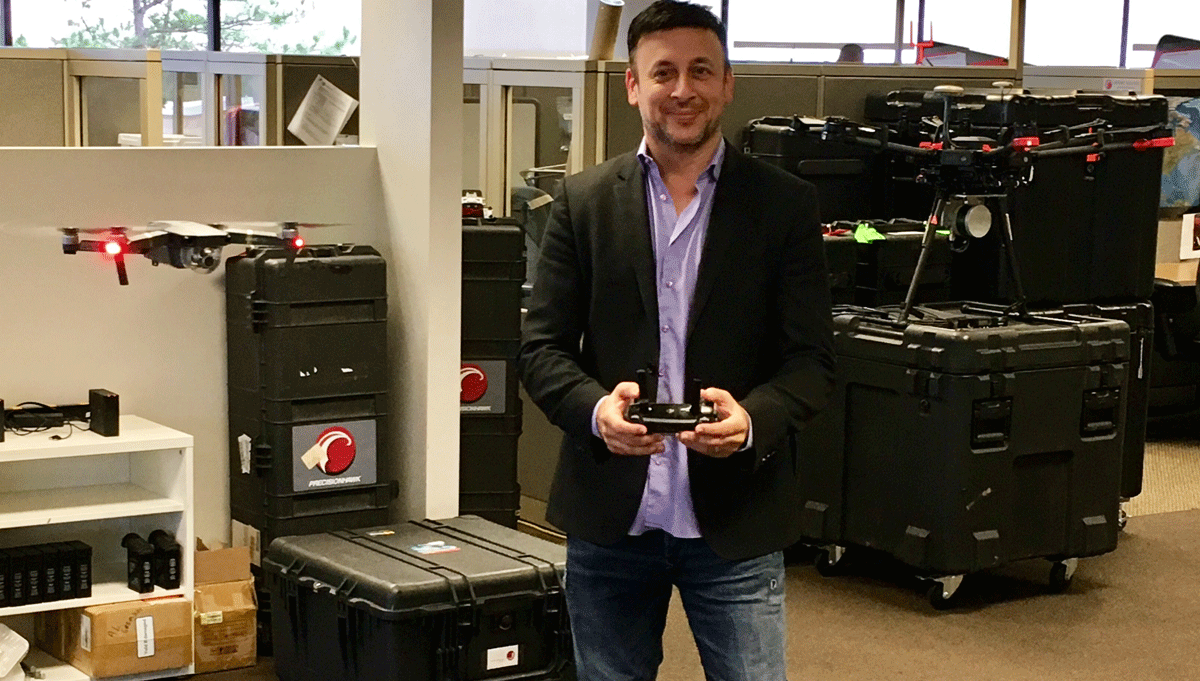Any organization looking to utilize drones for commercial purposes needs to work with the right people to ensure they’ll be able to effectively leverage the technology. That notion applies to the companies that are creating UAV products and services, and a recent development at PrecisionHawk is a perfect illustration of the concept.
Recently, PrecisionHawk announced that Blackboard Co-Founder and Former CEO Michael Chasen
has joined the company as their new CEO. Chasen brings more than 20 years of software experience to PrecisionHawk, where he’ll be tasked with leading and accelerating the company’s growth in the commercial UAV market.

Michael Chasen
I caught up with Chasen to talk about how his background in software will directly and indirectly influence what he wants to accomplish at PrecisionHawk, what sort of developments we can look forward to seeing with offerings like their Smarter Farming Package and plenty more.
Jeremiah Karpowicz: I promise not to get political here, but I imagine you’re seeing some pretty interesting distinctions between your home in Washington D.C. and Raleigh, North Carolina, where PrecisionHawk is based, no?Michael Chasen: You know, I'm actually finding the cities to be very similar. Both have really good tech scenes and both have a good mix of small city but livable rural area. Right now I'm commuting between the two with the kids still in school, but it's made it easier to see those similarities. They're both very livable cities.
The really nice thing is that it's easier to fly drones in Raleigh, because it's illegal to fly them just about anywhere in DC, so that makes it nice for the new job.
That new job is obviously what I want to focus on with you, and I have to say I thought it was funny to read that outgoing CEO Bob Young mention that he’s a good startup CEO, but a terrible large business CEO. He was clearly joking, but what can you tell us about your interest and plans to lead PrecisionHawk as a “large business CEO”?Just to give some additional background there, Bob is obviously a fantastic guy. He's the original founder of Red Hat, where he came up with an incredible idea and got together a group of really passionate people to build up the technology. When the company started to need a larger infrastructure to put in place the different parts of an organization, they ended up hiring a CEO. So I think that's the real setup and progression he was commenting on. His ability to innovate and come up with a vision was on full display there just like it is with PrecisionHawk, and his comments are really about recognizing his own strengths and weaknesses as well as the ones of the people he's working with.
I don't think Bob was trying to say that it's a question of a small company vs. a large company, it's just that my individual expertise is around building out infrastructure for numerous sales opportunities, and that is what's absolutely in front of PrecisionHawk right now.
Tell us a little bit about that experience, which centers on what you were able to accomplish as the co-founder and former CEO of Blackboard Inc.I started Blackboard with my old roommate from college, Matthew Pittinsky. He has a master’s degree in education from Harvard along with a Ph.D from Columbia, and he knew the education market. When we started Blackboard, he had the vision of the education industry and I had the experience to start building up the infrastructure we needed, and it turned out to be my forte. I built and ran the product development, sales, operations and marketing which allowed me to gain a great deal of expertise across the board in building out companies on a global scale. We ended up with 20 offices around the world and doing 650 million in revenue from Blackboard. That gave me a real depth of experience not just here in the US, but in other countries as well.
And how will that experience relate to your vision and goals for PrecisionHawk?PrecisionHawk is at the stage where the company as well as the market has really started to accelerate. Now that we have Part 107, companies that previously just had their toe in the water with drone technology know they can deploy drones on a much more massive scale. They want to use these tools to collect better business intelligence so they can make better decisions, and we're not talking about a one-off where the drone flies over a farm anymore. We're talking about creating large-scale deployments for actionable business data.
To be able to service that type of opportunity, you need a company that has a very strong infrastructure in place. What I bring to the table is an ability to compliment the passion and expertise that the existing PrecisionHawk team already has about the industry, with knowledge on how to set up a solutions group and a servicing team and put in place the infrastructure for the incredible growth we’re seeing.

Chasen at PrecisionHawk HQ
I ran into the company literally 8 weeks before they called me about this opportunity, which I think is both apropos and funny.
At SocialRadar, we were trying to figure out how to improve the blue dot on your mobile phone, which is to say we were trying to improve location accuracy. That blue dot was wrong half the time because the system was often making a guess about where someone was actually located, which was partly based on the maps it was using. As we were examining ways to make those maps more accurate, we thought about getting drones to fly over areas where we didn't have coverage and use LiDAR to get the exact locations of buildings. There weren't many companies that could even do something like that, but PrecisionHawk was one of them. It turned out, you couldn't always fly over all of the cities, and even then, it would have been a cost prohibitive venture. We ended up getting what we needed with satellite imagery.
Not even 8 weeks later I got an email saying that PrecisionHawk was doing an executive search, and that got an immediate reaction from me because I knew how great their solution was. PrecisionHawk was one of the few companies that had the experience, expertise and technology to actually do what we had envisioned for that project. When they got in touch, I already knew what kind of opportunities were going to be out there around gathering better and more accurate data using drones, and immediately saw how we could take that to the next level.
Given your experience in early-stage technologies, what can you tell us about the opportunities that exist in this kind of environment?Many of the opportunities in the commercial drone space are related to not having to steal market-share away from an existing competitor because we're still growing. Those are the sorts of things that exist in every early-stage market, because we’re talking with people about utilizing this type of technology for the first time. It's very similar to what I did at Blackboard.
It's funny, because when I started at Blackboard, our very first venture capital investor called up 5 schools to do their due diligence on us to see if they would utilize technology to put courses online. The feedback they got from that outreach was that those schools would never use technology to put courses online. The feedback was that teachers were luddites, and students were not interested.
The thing is, we knew that 100% of schools were eventually going to put course material on the Internet. The majority of schools use Blackboard to supplement their traditional classes. Originally though, this was an industry where none of the schools were using technology. When we went out and had an 80% market share, it wasn't because we were stealing that market share. Schools were doing it for the first time, which is why we became the market leader.
That's the opportunity in front of the drone industry, because the conversations we're having aren't around switching solutions, they’re about explaining how they can deploy drone technology and the analytics that are going to help make better business decisions. We can then become a partner in creating this opportunity.
Are recent headlines associated with layoffs and recalls just a natural part of these early-stage industries?Everyone needs to remember that there were probably around 200 video companies before YouTube and then Vimeo really established themselves. Many of them had different business models, and obviously not all of them were able to make those work. You can take any industry and look at the early days, when everyone was trying to figure out the business model and how they could play in it.
What you have in these early-stage environments is a bunch of companies all competing to be #1. There's plenty of room for more than one, but a lot of people are making bets, and not all of those bets pay off. A lot of people don't make the right investment, or don't get enough capital, or they can't get the technology to work. Those are all risks, which is why in the beginning there's always a lot of disruption.
Do you think offerings like the Smarter Farming Package are an essential way to showcase how specific professionals can embrace drone technology? Absolutely.
The progression that we’ve seen with drones is similar to the progression of other technologies. At first you had to go out and buy your own drone, and then figure out how to use it. As the technology progressed users were able to attach some sensors and get some great photos that they didn't know what to do with. Now though, we’ve been able to take all of that to another level with offerings like the Smarter Farming Package.
With our package, users can easily capture photos and run an analysis on them to tell them what they’re looking at and help make those business decisions. This package is very easy to use, but we’re focused on improving the offering in numerous ways. That's the kind of commitment to users you're going to see coming from us.
Is that kind of offering something you’ll look to create for professionals in industries other than precision ag? How will that impact the direction you want to establish for the company as a whole?We’ve had such success with this package that we're already starting to put together other, smarter packages for different industries. Offering users an off-the-shelf drone technology with the right software and algorithms to allow them to get actionable business intelligence and data right away is absolutely critical for users of all types and sizes.
At an enterprise level, we realize that companies don't want canned reports, so we’re partnering with many different organizations to determine how they can best utilize drone technology to improve a business process or better capture data that automatically feeds into their backend to allow them to reduce expenses, increase revenue, etc.
In terms of our direction going forward, we need to not just be looking at developing technology for the needs of this generation, but also for the needs of the next generation. What I bring to the table isn't so much for PrecisionHawk today, but for where PrecisionHawk needs to go over the next few years. I have a certain level of operational expertise and experience that can put the company in a great position for the hyper-growth that we're seeing take place throughout the drone industry.

















Comments